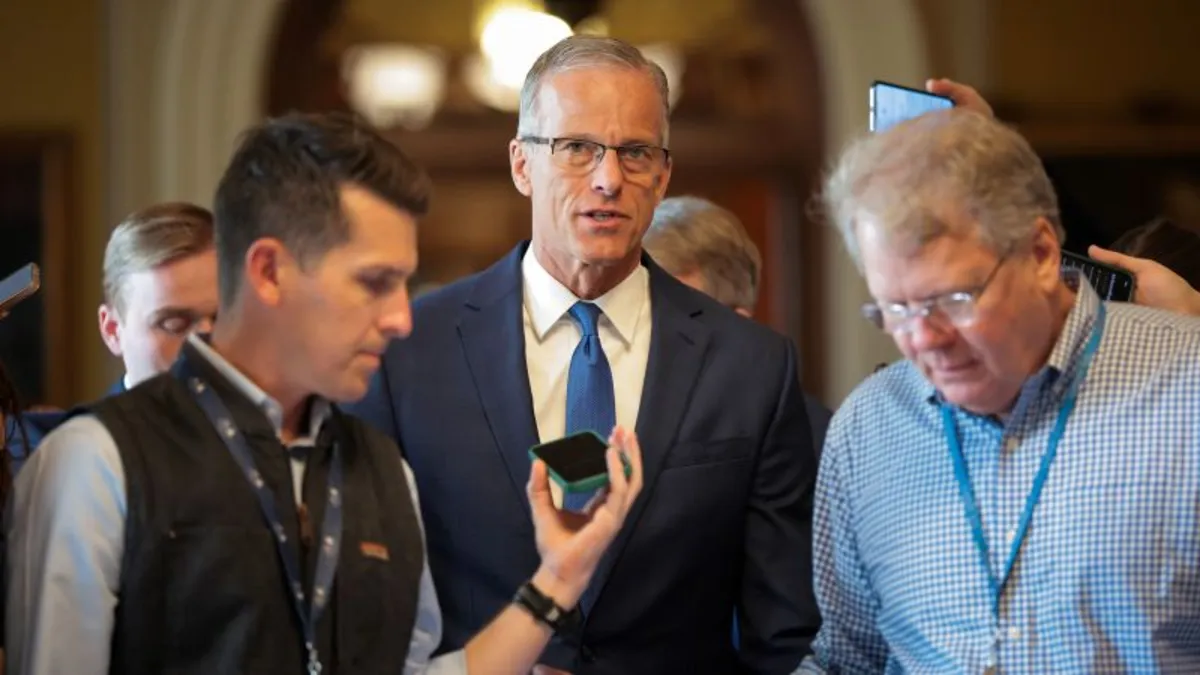
On Monday, President Donald Trump engaged in discussions with several Republican senators regarding his sweeping domestic policy bill. This meeting comes as Congress prepares to make significant changes to the legislation, with congressional leaders aiming to have the finalized package on Trump’s desk by the July 4 holiday. However, the road ahead appears challenging, as a number of GOP senators have expressed concerns about the House-passed package. They are seeking amendments that could be difficult for Speaker Mike Johnson’s narrow majority to accept when the bill returns to the House for further consideration.
During a White House meeting, President Trump spoke with Senate Majority Leader John Thune. Thune remarked that they “covered a lot of ground,” particularly regarding the intricacies of the “big, beautiful bill.” A White House official confirmed their meeting, emphasizing its significance in the ongoing legislative process. Senators who have been vocal about their reservations, including Sen. Josh Hawley from Missouri, Sen. Ron Johnson from Wisconsin, and Sen. Rand Paul from Kentucky, also participated in discussions with the President. Paul highlighted in an interview with CNN that he conveyed his inability to support the bill if it included an increase to the debt ceiling.
Senator Paul stated, “It’s just not a conservative thing to do,” emphasizing that if the debt ceiling and the domestic policy bill remained intertwined, he could not support the legislation. He noted that if the debt ceiling were removed, he could reconsider backing the rest of the bill. Meanwhile, Sen. Ron Johnson expressed that he received a positive call from Trump, where they discussed the need for more stringent spending cuts than those included in the House bill. Johnson expressed a willingness to be flexible and indicated that he could support a modified version of the bill if it included commitments for future cuts.
In a post on Truth Social, Trump urged Senate Republicans to expedite the passage of the bill before the Fourth of July. He stated, “I call on all of my Republican friends in the Senate and House to work as fast as they can to get this Bill to MY DESK before the Fourth of JULY.” This call to action reflects the urgency surrounding the legislative process and the importance of aligning GOP senators behind the President's agenda.
Senator Hawley, who has voiced strong concerns regarding potential changes to Medicaid, reiterated that he discussed the bill with Trump. He emphasized that the President assured him there would be no cuts to Medicaid benefits. Hawley urged that any taxes implemented should not penalize those reliant on Medicaid, as they typically cannot afford private health insurance. He stressed the importance of maintaining access to healthcare for low-income individuals.
As discussions continue, several GOP senators have outlined their red lines for Trump’s “big, beautiful bill.” Senator Thom Tillis highlighted the need for careful consideration of work requirements in the House's bill, particularly for states that have expanded Medicaid. He noted that it is essential to allow state legislatures to offer recommendations on the implementation of these changes. Senator Susan Collins acknowledged that while she found the work requirements acceptable, she raised concerns about provisions related to provider taxes that could affect federal funding for states.
Senator Shelley Moore Capito shared insights from her discussions with constituents in West Virginia, where there are growing concerns about the implications of the Medicaid changes on local hospitals. Similarly, Senator Jerry Moran expressed worries about the potential negative impact on hospitals that had previously received COVID relief funding. Another contentious issue is the rollback of Biden-era clean energy tax credits, with senators like Tillis advocating for a balanced approach that respects investments already made in clean energy initiatives.
As the Senate gears up for a swift legislative process, Senator John Cornyn indicated that the goal is to have the bill on Trump's desk by July 4, highlighting the need for expedited discussions. He cautioned that the House may have to accept whatever passes the Senate, underscoring the intricate dynamics of legislative negotiations. As the GOP navigates its priorities and challenges, the path toward passing the domestic policy bill remains complex but critical.